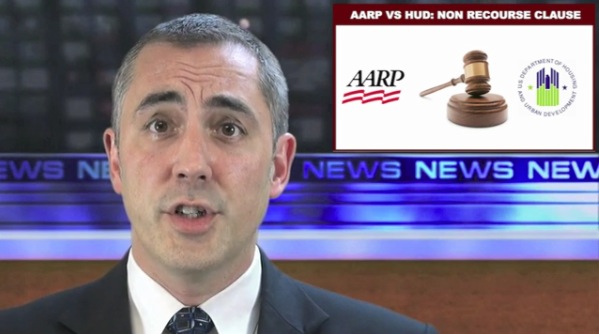[vimeo id=”20939583″ width=”601″ height=”338″]
Industry Leader Update: March 14, 2011 from Shannon Hicks on Vimeo.

[vimeo id=”20939583″ width=”601″ height=”338″]
Industry Leader Update: March 14, 2011 from Shannon Hicks on Vimeo.
Share:
Get the latest reverse mortgage news delivered straight to your inbox.
7 Comments
Thank you very much for your crisp and thoughtful presentation on the AARP lawsuit against HUD.
I should point out that the lawsuit is one of the consequences, not the cause. HUD’s own bureaucratic ineptitude, arrogance, and doubletalk (evidenced in the odious mortgagee letter) is the cause. So the “cloud” over the industry is HUD’s responsibility.
If only HUD had but listened to me when I laid out the issues in four articles two years ago and urged it to revoke the mortgagee letter, this lawsuit and its consequences could have been prevented.
This possible grandmother of all exposure for HUD and the industry was entirely preventable if HUD and industry leaders had but listened when I sounded the alarm (at great personal risk) two years ago.
I also addressed the non-borrowing spouse issue several years ago and in a retrospective last May. I warned of the risks it poses for non-borrowing spouses, lenders, investors, and HUD. Again, no one listened. Here is a link to my piece on non-borrowing spouses: http://www.timlinger.com/?page_id=524
Atare,
While you specifically address issues regarding legally removing a spouse from title in the article posted on Tim’s website, you do not address the non-borrowing spouse issue per say in that article. For example, here in one case the effected spouse never was on title (and the HECM could have been closed long before the marriage). That is much different than legally removing a spouse from title. In the other two instances, there is an alleged element of fraud related to the removal of each of those spouses from title.
The March 8th AARP Press release states:
(1) “Plaintiff Delores J. Moore of Covington, Indiana, age 79, married Mr. Moore late in life and was never added to the deed to the home or the HECM mortgage;”
(2) “Plaintiff Leila Joseph of Brooklyn, New York, age 77, was removed from the deed to the property when her husband, suffering from dementia at the time, entered into the reverse mortgage:” and
(3) “Plaintiff Robert Bennett of Annapolis, Maryland, age 69, had jointly owned the home with his wife since 1981. Unbeknownst to him, he was removed from the deed when the HECM was executed. His wife, who was seriously ill at the time, died the following month.”
The displaced spouse issue as presented by the attorneys in the AARP press release is based on their apparently unique interpretation of the statute at 12 USC 1715z-20(j). While all three cases potentially may argue Mortgagee Letter 2008-38, it would seem they would only have cause IF the HECM balance due exceeded the value of the home at the time of death of the related spouse; however, there is no clear indication as to which of these cases, if any, the ML applies. It is never alleged in the press release that ML 2006-25 (your primary focus in the 2010 article on Tim’s website) applied in any of these cases.
Since some readers may not have access to the US Codes, here is a complete copy of 12 USC 1715z 20(j):
“(j) Safeguard to prevent displacement of homeowner
The Secretary may not insure a home equity conversion mortgage under this section unless such mortgage provides that the homeowner’s obligation to satisfy the loan obligation is deferred until the homeowner’s death, the sale of the home, or the occurrence of other events specified in regulations of the Secretary. For purposes of this subsection, the term ‘homeowner’ includes the spouse of a homeowner. Section 1647 (b) of title 15) and any implementing regulations issued by the Board of Governors of the Federal Reserve System shall not apply to a mortgage insured under this section.”
This should be an interesting suit. It seems hard to explain this section any other way than how the attorneys for the plaintiffs are doing it. On that basis a 62 year old who gets a HECM today and then remarries at 85 to a 42 year old would mean HUD would have to wait until the 42 year old violated a covenant before being off the hook for insuring the loan. What would happen if the 42 year remarried a 40 year old at age 80? Could this provision create a possible unending insurance situation for FHA in some situations?
If the court finds for the plaintiffs, no doubt HUD will try to get Congress and the President to amend this provision retroactively to read like most of us understood the program to be before this suit.
It amazes me how many times I hear people say they were removed from title without their knowledge. I had assume that every state was the same and they would have to sign something for that.
Very true. For years I had always seen clear disclaimers stating the risks of removing a co-owner from title which the primary borrower had to sign.
I have not been exposed to reverses enough to totally understand the consequences of this action. I am very happy to see this discussion, it will make me a better loan officer.
A possible consequence if the lawsuit is successful could be that future HECM borrowers would no longer be able to remove an under age spouse from title to obtain a reverse mortgage (Federally Insured).